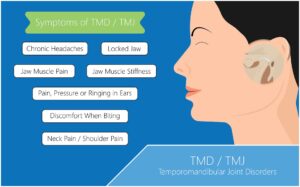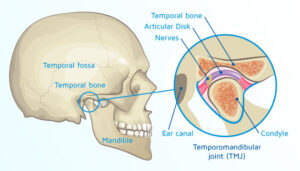
Temporomandibular Joint Disorder (TMD) can have profound effects on your daily life, and it’s important to grasp how leaving it untreated can influence your well-being. Here’s a closer look at how untreated TMD can affect your life, backed by evidence:
Chronic Pain and Its Consequences: TMD often manifests as persistent jaw, facial, neck, and head pain. This discomfort can range from mild to severe, and it can become constant and debilitating over time. Research published in “The Clinical Journal of Pain” (2011) shows that individuals with untreated TMD often experience chronic pain, significantly impacting their quality of life.
Limited Jaw Function Hindering Daily Activities: TMD can lead to restricted jaw mobility, making it challenging to perform basic functions. Research in the “Journal of Oral Rehabilitation” (2015) highlights that untreated TMD can result in limited jaw mobility and reduced function. Eating, speaking, and even smiling can become difficult tasks.
Structural Damage to the Joint: Long-term untreated TMD can lead to structural changes in the temporomandibular joint itself. This may involve cartilage damage, the development of osteoarthritis, or other structural alterations. Evidence from the “Journal of Oral and Maxillofacial Surgery” (2001) has documented such structural changes resulting from untreated TMD.
Secondary Complications and Their Impact: Untreated TMD can contribute to secondary complications. Chronic pain can disrupt sleep patterns, leading to sleep disorders like insomnia and sleep apnea. Additionally, persistent pain and discomfort can contribute to heightened stress, anxiety, and even depression. Studies in the “Journal of Oral and Facial Pain and Headache” (2019) have shown the link between untreated TMD and these secondary complications.
Daily Life Disruption: TMD symptoms significantly affect daily life, making tasks like eating, speaking, and emotional well-being challenging. This can lead to dietary restrictions, social withdrawal, and a diminished quality of life. Research published in “Oral Surgery, Oral Medicine, Oral Pathology, and Oral Radiology” (2017) emphasizes how TMD symptoms negatively impact daily life and overall well-being.
Symptoms Worsening Over Time: TMD symptoms tend to worsen if left untreated. What may start as mild discomfort or occasional pain can escalate into severe, unrelenting pain. A longitudinal study in the “Journal of Dental Research” (2010) found that TMD symptoms can indeed worsen over time without intervention.
Increased Healthcare Costs: Delaying treatment for TMD can lead to more extensive and costly interventions in the future. This may involve surgeries, extended rehabilitation, or specialized treatments. An article in “The Journal of Prosthetic Dentistry” (2019) discusses how delayed treatment of TMD can result in increased healthcare costs.
The evidence underscores the importance of addressing TMD symptoms promptly. Seeking care from a qualified healthcare professional, such as a TMJ specialist or a dentist experienced in TMD management, can significantly improve your prognosis. Early intervention can lead to better outcomes, alleviate pain, and enhance your quality of life. Don’t let TMD disrupt your life—take action to seek evaluation and treatment today. Your well-being is worth it.







